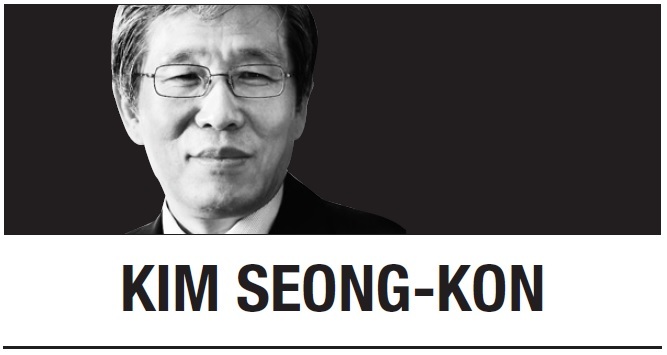[Kim Seong-kon] Journey to the past through historical fiction
By Korea HeraldPublished : July 6, 2022 - 05:30

Oh Yoon-hee’s recently published historical novel, “The Eerie Story Club at Samgae Tavern & Inn, Book III” is a good example. Just like her previously published Book I and Book II of the same title, Book III consists of six bizarre and uncanny stories set in the 17th or 18th century. Each story touches upon the contemporary social problems we are now experiencing in 21st-century Korea.
“The Eerie Story Club at Samgae Tavern & Inn, Book III” is presumably inspired by “The Jehol Diary,” a travelogue written by 18th-century Korean writer and thinker, Bak Jiwon, who traveled extensively in the northern part of China as an aide to the King’s envoy to the emperor of the Qing Dynasty. Indeed, the fictitious narrator Seonnomi in Oh’s novel is a valet to Bak Jiwon and the stories recounted in the novel are overheard during Seonnomi’s travels in the King’s entourage.
The first story, “The Ferryman on the Yalu River,” delves into the symbolism of a ferryman who takes his passengers to China and then later brings them back to Joseon, today’s Korea. He thinks of himself as not merely a boatman, but as a guide to another world. Indeed, a ferryman is someone who crosses the border and closes the gap between two worlds.
In our contemporary society, we, too, urgently need spiritual ferrymen who can take us to a new world, traveling back and forth between two worlds. We need those who can be interpreters, or act as a bridge or a cultural ambassador that connects our country to other countries. The late thinker and cultural critic Lee O-young once said, “Intellectuals are those who do not have a particular homeland.” Indeed, a true intellectual is a global citizen who can transcend and cross boundaries.
The second story, “Return of a Prodigal Son,” uses a historical comparison to reflect the real estate problems of contemporary Korean society. Set in the Joseon Kingdom, the story recalls that during this period, too, real estate prices were skyrocketing due to overpopulation. As a result, it was extremely difficult to own a home in Hanyang, today’s Seoul. To make matters worse, government officials often took common people’s homes by force. It resonates with our previous government, which intimidated homeowners with a tax bomb.
At the center of “Return of a Prodigal Son” is a tale about sibling rivalry and jealousy. It is not hard to see this as a parable of today’s Korean society. We Koreans are like brothers and sisters and yet we are full of resentment and hate each other, due to jealousy or ideological differences.
The third story, “The Village That Smallpox Visited” points out the hypocritical self-righteousness of those who chant, “For the greater good!” or “For a grand cause!” It is no coincidence that such people are the ones oppressing the minorities or even killing them under the banner of “justice.” In the eyes of those people, minorities are nothing but collateral damage and individuals must sacrifice themselves for the community, the town, or the country.
“The Village That Smallpox Visited” can be read as “The Country That COVID-19 Visited.” Under the excuse of public safety, the government has restricted individuals’ freedoms and surveilled people’s private lives.
The fourth story, “The Curse of Red Silk” unfolds a tragic story of Crown Prince Sohyeon and his wife, Lady Kang, during the reign of King Injo in the 17th century. While staying in the capital city of the Qing Dynasty as political hostage, the prince opens his eyes to the world through his friendship with the French and German ambassadors to China. Lady Kang, too, takes care of the Joseon people who are dragged to China as slaves after the Chinese invasion of Korea in 1636.
Upon returning to Joseon later, Crown Prince Sohyeon brings with him the world atlas and insists on reforms that will immediately open up the country. Instead, King Injo killed his own son, Sohyeon and even grandson, in addition to his daughter-in-law, Lady Kang. The lesson for our contemporary world is clear: Even today, an incompetent and myopic political leader who does not know the world can make the same mistake.
The fifth story, “Hwapi” warns us of the foolishness of seeking physical beauty only. In today’s Korean society, however, people easily fall for good-looking appearances, and thus cosmetic surgery is rampant.
The sixth story, “Paradise” depicts a society where soulless zombielike people are living happily, mistaking their country for paradise. They do not know that in fact, wicked people are exploiting and manipulating them.
Reading historical fiction, we come to realize that regrettably, we keep repeating the mistakes of the past.
Kim Seong-kon
Kim Seong-kon is a professor emeritus of English at Seoul National University and a visiting scholar at Dartmouth College. The views expressed here are his own. -- Ed.
-
Articles by Korea Herald







![[Graphic News] More Koreans say they plan long-distance trips this year](http://res.heraldm.com/phpwas/restmb_idxmake.php?idx=644&simg=/content/image/2024/04/17/20240417050828_0.gif&u=)
![[KH Explains] Hyundai's full hybrid edge to pay off amid slow transition to pure EVs](http://res.heraldm.com/phpwas/restmb_idxmake.php?idx=644&simg=/content/image/2024/04/18/20240418050645_0.jpg&u=20240419100350)






![[From the Scene] Monks, Buddhists hail return of remains of Buddhas](http://res.heraldm.com/phpwas/restmb_idxmake.php?idx=652&simg=/content/image/2024/04/19/20240419050617_0.jpg&u=20240419175937)

![[KH Explains] Hyundai's full hybrid edge to pay off amid slow transition to pure EVs](http://res.heraldm.com/phpwas/restmb_idxmake.php?idx=652&simg=/content/image/2024/04/18/20240418050645_0.jpg&u=20240419100350)

![[Today’s K-pop] Illit drops debut single remix](http://res.heraldm.com/phpwas/restmb_idxmake.php?idx=642&simg=/content/image/2024/04/19/20240419050612_0.jpg&u=)